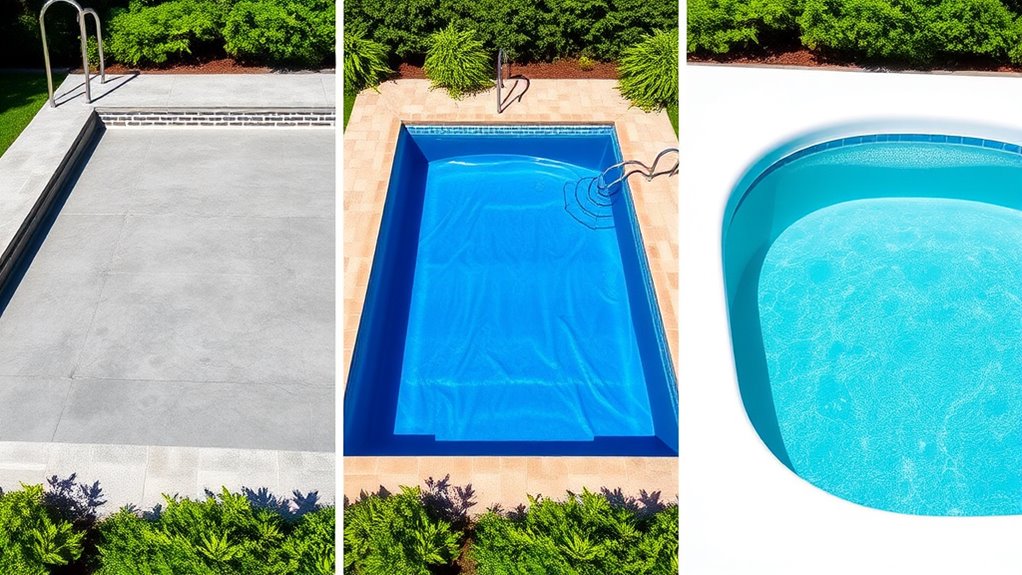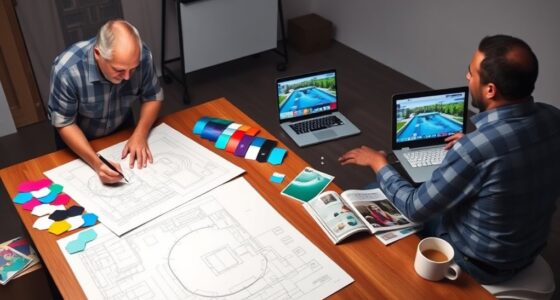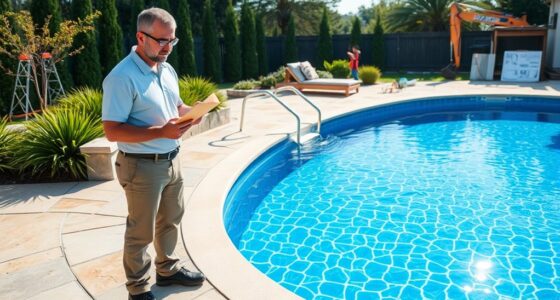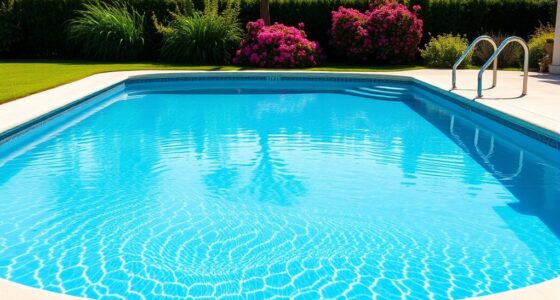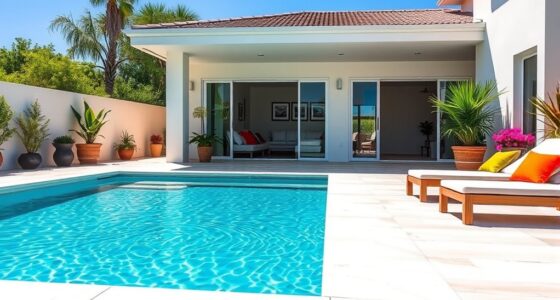When choosing between concrete, vinyl, and fiberglass pools, consider your budget, timeline, and aesthetic goals. Concrete offers high customization and durability but requires a higher upfront cost and maintenance. Vinyl pools are more affordable and quick to install but need liner replacements every 7-15 years. Fiberglass pools combine low maintenance, quick setup, and good durability. To explore which type suits your needs best, keep looking into their features and options.
Key Takeaways
- Concrete pools offer high customization and durability but involve higher upfront costs and ongoing maintenance.
- Vinyl pools are more affordable initially but require liner replacements every 7-15 years and have moderate durability.
- Fiberglass pools provide quick installation, low maintenance, and resistance to cracking, making them a convenient long-term option.
- Concrete pools allow extensive design flexibility with custom shapes, finishes, and features, unlike pre-designed fiberglass options.
- Overall, budget, aesthetic preferences, and maintenance capacity are key factors in choosing among concrete, vinyl, and fiberglass pools.
Cost, Installation, and Initial Setup
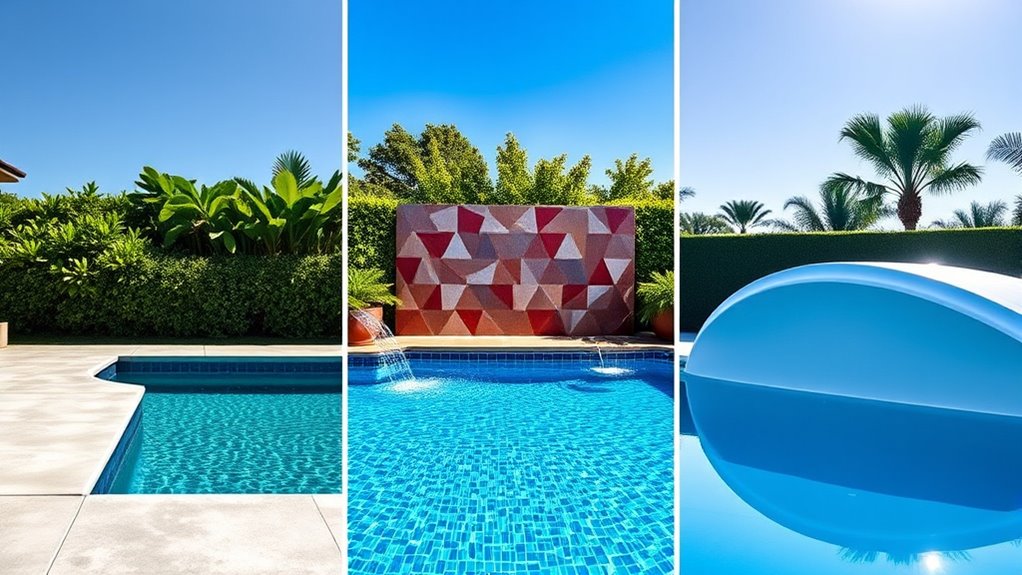
When choosing a pool type, understanding the costs, installation process, and initial setup is essential. Concrete pools usually have the highest upfront costs due to materials and labor, but they offer customization options. Vinyl pools tend to be more affordable initially but may require liner replacements over time. Fiberglass pools generally have moderate installation costs and quick setup, as they come prefabricated in shells that are lowered into excavated holes. The installation process varies: concrete pools involve extensive excavation, steel reinforcement, and pouring concrete, taking several weeks. Vinyl pools require lining installation after excavation, which is faster. Fiberglass pools are installed swiftly, often within a week. Consider your budget, timeline, and preferences to determine which option best fits your needs.
Maintenance, Durability, and Longevity
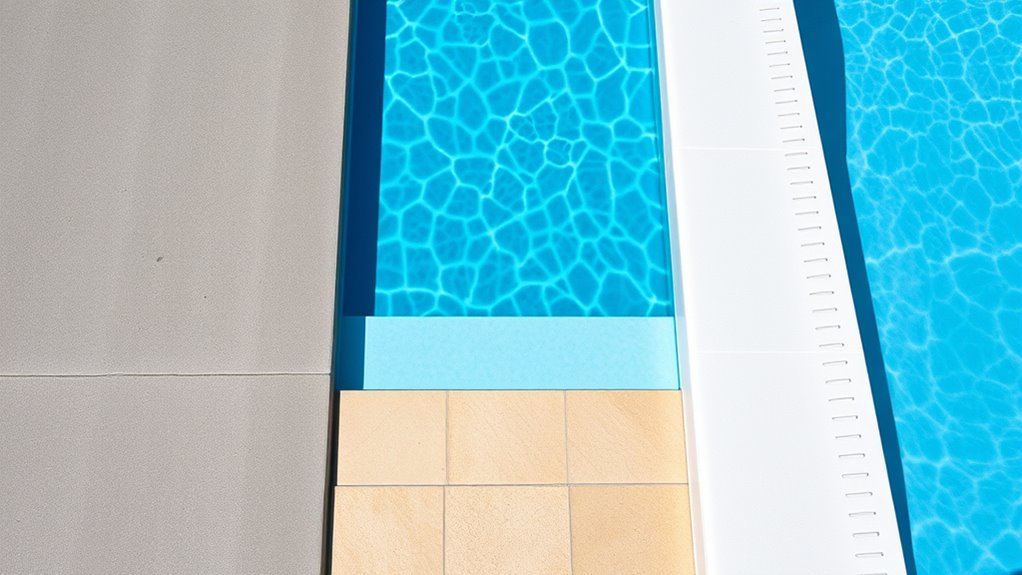
| Feature | Concrete | Vinyl | Fiberglass |
|---|---|---|---|
| Maintenance | High, sealing & resurfacing. Regular inspections are necessary to prevent surface issues. | Moderate, liner replacement. Proper cleaning extends the lifespan of the liner. | Low, smooth surface. Minimal cleaning required due to its slick finish. |
| Durability | Very durable, cracks possible. Can withstand various weather conditions when properly maintained. | Moderate, liner wear. The liner may need reinforcement if exposed to sharp objects. | Very durable, resistant to cracking and fading. Suitable for various climates. |
| Longevity | 25+ years with care. Proper maintenance can significantly extend lifespan. | 7-15 years, replacement needed. The liner’s lifespan depends on usage and maintenance. | 25+ years, minimal repair. Its resilience makes it a long-term investment. |
| Repair Costs | High. Repairs often involve significant work and expense. | Moderate, liner repair or replacement. Minor damages can be fixed more easily. | Low, surface scratches or minor cracks are easy to repair. |
| Overall Longevity | Long-lasting if maintained. Proper upkeep can maximize lifespan. | Shorter lifespan, affordable. Suitable for budget-conscious homeowners. | Long-lasting, low upkeep. Ideal for those seeking durability with minimal effort. |
Choosing the right pool also means considering how much effort it’ll take to keep it in good shape over time. You want a durable option that lasts and minimizes repairs. Concrete pools are highly customizable but require regular resurfacing and sealing, which can be costly. Vinyl liners need replacing every 7-15 years, and fiberglass pools resist cracks better but can suffer from surface scratches. Here’s a quick comparison:
Concrete pool maintenance can be intensive, but its durability and customizable features make it a popular choice among homeowners.
Aesthetic Options and Customization
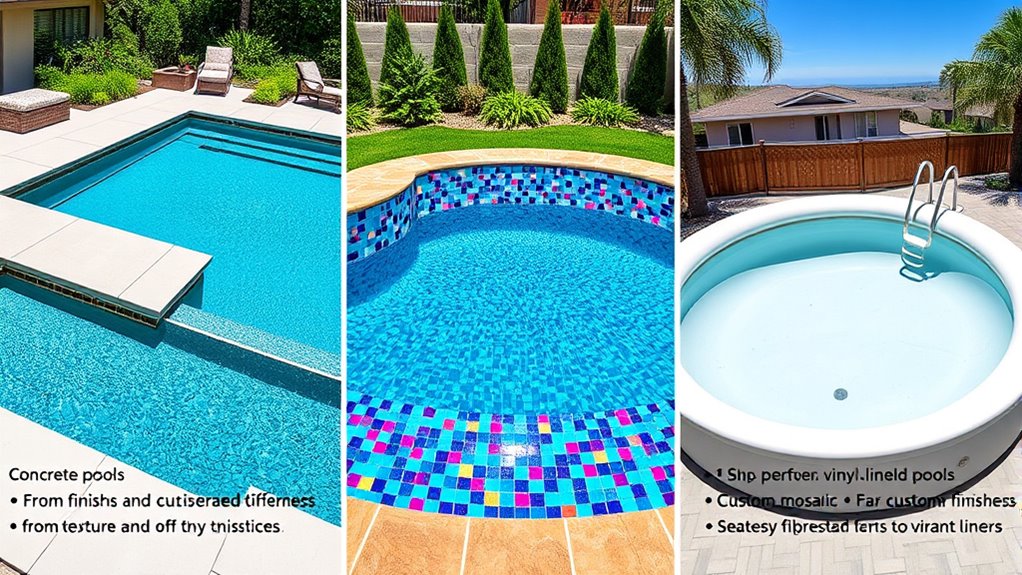
Aesthetic options and customization choices allow you to transform your pool into a stunning centerpiece that reflects your personal style. With concrete pools, you gain endless design flexibility—you can choose custom shapes, sizes, and finishes. You can add waterfalls, tanning ledges, or built-in seating to enhance functionality and visual appeal. Color accuracy and high-quality finishes contribute significantly to the overall aesthetic. Additionally, many concrete pools incorporate specialized finishes such as plaster, tile, or aggregate surfaces, further enhancing their visual appeal. Vinyl pools offer a variety of patterns and colors for liners, giving you a chance to personalize the look easily and affordably. Fiberglass pools come pre-designed, but many manufacturers offer gel-coat options and accessories that can boost their visual appeal. Lighting options, tile accents, and decorative coping further elevate your pool’s aesthetics across all types. Ultimately, your choices help create a unique, inviting oasis tailored precisely to your taste. Design flexibility is a key advantage of concrete pools, allowing for highly customized features and layouts. Additionally, considering market trends can help inform your aesthetic decisions to ensure your pool remains stylish over time. Incorporating color options can further enhance the visual harmony with your landscape and home exterior.
Frequently Asked Questions
Which Pool Type Is Best for Saltwater Systems?
When choosing a pool for a saltwater system, you need to think about how well it withstands salt. Saltwater can be harsh on certain materials, causing corrosion or damage. You’d want a pool that resists corrosion and requires minimal maintenance. Fiberglass pools are often the best choice because they’re resistant to salt and chemicals, making them durable and easier to care for. Vinyl pools can also work, but concrete pools may need more upkeep.
How Do Pool Types Impact Energy Efficiency?
Did you know that energy-efficient pools can save you up to 50% on operating costs? Your pool type considerably impacts this. For example, fiberglass pools typically retain heat better and require less chemical treatment, saving energy. Vinyl pools may need more frequent liner replacements, increasing maintenance energy. Concrete pools, while durable, often consume more energy due to their heat loss and chemical needs. Choosing the right type helps you cut costs and conserve energy.
Are There Health Risks Associated With Each Pool Material?
You wonder if any health risks come with pool materials. While generally safe, vinyl liners can harbor bacteria if not maintained properly, and fiberglass pools might cause irritation from resin chemicals. Concrete pools can develop rough surfaces that trap dirt or algae. To stay safe, keep your pool clean, guarantee proper chemical balance, and regularly inspect for any surface issues, regardless of the material you choose.
Can These Pools Be Easily Repaired if Damaged?
When your pool gets damaged, repairs can vary in difficulty depending on the type. Vinyl liners are relatively easy and inexpensive to replace, typically within a few days. Fiberglass pools usually require professional repair for cracks or chips, which can be costly and time-consuming. Concrete pools are the most durable but may need extensive work for cracks or surface damage. Overall, vinyl pools are the simplest to repair quickly.
What Are the Environmental Impacts of Each Pool Type?
Thinking about the environmental impact of your pool is like considering the ripple effects of your choices. You’ll find that concrete pools require more energy and resources for construction and maintenance, while vinyl pools involve plastics that may not be as eco-friendly. Fiberglass pools generally have a smaller carbon footprint due to easier installation and lower chemical use. Choosing wisely helps you enjoy your backyard while also caring for the planet.
Conclusion
Ultimately, choosing between concrete, vinyl, and fiberglass pools depends on your desires and dollars. Deliberate on durability, design, and maintenance to determine your perfect pool. Whether you favor the flexibility of concrete, the affordability of vinyl, or the ease of fiberglass, each option offers unique advantages. Make your decision wisely, weighing the whims of your wants and the weight of your wallet. With careful consideration, you’ll create a mesmerizing, carefree backyard oasis tailored just for you.
